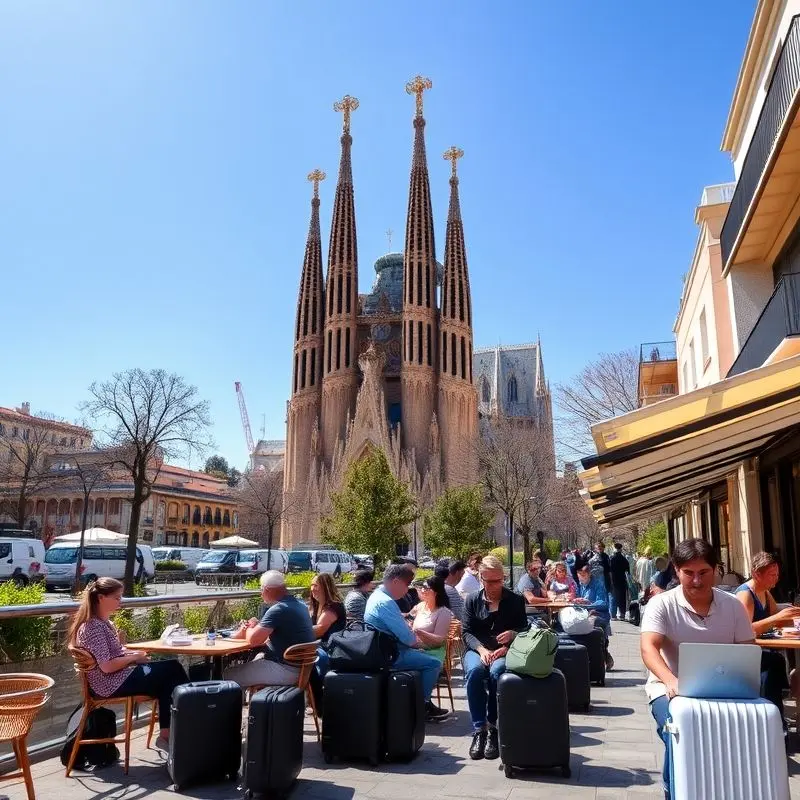Looking for a Job and a New Life? Here’s Everything You Need to Know About Work-Based Residency in Spain

Ever dreamed of sipping café con leche after a morning meeting… in Madrid? Or spending weekends at the beach while building a meaningful career? Spain might just be your ticket to a vibrant new life.
Whether you’re chasing career growth, a slower pace, or just something new—work-based residency in Spain is one of the most appealing ways to start fresh abroad. Let’s break down everything you need to know, from job hunting to settling into your Spanish dream life.
Why Spain? A Dream Destination for Workers and Expats
The Spanish Lifestyle – A Magnet for Global Talent
Imagine siestas, sunny days, rich culture, and mouthwatering tapas. Spain’s lifestyle is relaxed yet fulfilling. It attracts creatives, tech professionals, educators, and freelancers from around the globe.
Cost of Living vs. Quality of Life
Compared to other Western European countries, Spain offers an incredible cost-to-quality ratio. Cities like Valencia and Seville offer metropolitan vibes without the sky-high prices of Paris or London. That’s why so many are making the informed decision to relocate.
Understanding Work-Based Residency in Spain
What is a Work-Based Residency Permit?
A work-based residency permit allows you to legally live and work in Spain. It’s more than just a visa—it’s your gateway to fully integrating into the Spanish lifestyle.
Benefits of Having a Work-Based Residency
- Legal right to live and work in Spain.
- Access to public services like healthcare and education.
- Eligibility for family reunification.
- Pathway to permanent residency or citizenship.
Types of Work Visas Available in Spain
- Highly Skilled Worker Visa
- Seasonal Work Visa
- EU Blue Card
- Self-Employment Visa (Autónomo)
Transitioning from a Tourist to a Resident Worker
Is it Possible to Switch Visas from Within Spain?
Yes—but with conditions. You’ll need to apply for a change of status before your tourist visa expires. This is often a transitional keyword moment where many people choose to consult an immigration lawyer.
How to Get a Job Offer While Visiting Spain
This is possible if you:
- Attend networking events.
- Apply to jobs via portals like InfoJobs and LinkedIn.
- Leverage informational interviews with locals and expats.
Eligibility Criteria for Spain’s Work Residency
Who Can Apply?
Most non-EU nationals can apply, provided they:
- Have a valid job offer.
- Meet educational or experience requirements.
- Don’t have a criminal record.
Educational & Professional Requirements
While a degree is useful, experience can often speak louder than paper—especially in sectors like hospitality, construction, or IT.
Spanish Language – Is it Mandatory?
Not always—but it definitely helps, especially outside of major cities. Knowing Spanish gives you a competitive edge and opens more job opportunities.
Step-by-Step Guide to Applying for a Work-Based Residency
Finding a Sponsor or Employer
You’ll need a Spanish company willing to sponsor you. Your contract must be signed before application.
Gathering the Necessary Documents
- Valid passport
- Job contract
- Police clearance
- Proof of qualifications
- Medical certificate
Submitting the Application
Submit your documents at a Spanish consulate (or locally, if eligible). You’ll get a NIE (Foreigner Identification Number)—your official ID in Spain.
Spain’s Most In-Demand Jobs for Foreigners
Sectors That Are Hiring Right Now
- Tech & IT
- Healthcare
- Construction
- Teaching (especially English)
- Digital Marketing
Skills That Give You an Edge
- Bilingual abilities
- Experience with EU regulations
- Digital literacy
Living in Spain: What to Expect
Housing, Transportation, and Utilities
Rent varies by city, but expect around €700–€1,200 for a decent flat. Public transport is cheap and reliable. Utilities are generally reasonable.
Health Insurance and Medical Care
Public healthcare is excellent, and private insurance is affordable—often under €50/month.
Work Culture and Social Life
Expect a balanced life. The 9-5 exists, but people prioritize well-being. After-hours drinks or “tapas crawls” are common ways to network.
Taxes and Social Security for Foreign Workers
Do You Pay Taxes in Spain as a Foreigner?
Yes. If you’re a resident (living in Spain >183 days/year), you’ll pay income tax based on your global earnings.
Social Security Benefits for Residents
You contribute to social security, which covers healthcare, unemployment, and pensions. It’s an investment in your future.
How Long Can You Stay on a Work-Based Residency?
Residency Duration and Renewal Options
Initial permits usually last 1–2 years and are renewable. After five years, you may apply for permanent residency.
Pathway to Permanent Residency and Citizenship
Stay legal, renew on time, and you could apply for Spanish citizenship after 10 years (or even sooner for some Latin American nationals).
Common Mistakes to Avoid
Incomplete Applications
Always double-check paperwork. A missing form could delay months of progress.
Choosing the Wrong Visa Type
Each visa has its own rules. Don’t assume one-size-fits-all.
Not Understanding Contract Terms
Get your contract reviewed. Know your rights regarding pay, hours, and termination.
How to Find a Job Before Moving to Spain
Best Job Portals for Spain
- InfoJobs
- Indeed Spain
- Glassdoor
- Jobandtalent
How to Network Like a Local
Join expat groups, attend job fairs, and connect on social media. Sometimes, a coffee chat turns into a job opportunity.
Real Stories – How People Changed Their Lives
From Tourist to Resident in 6 Months
Maria, a graphic designer from Mexico, landed a remote job while visiting Valencia and switched her status legally in under six months.
Finding Fulfillment in the Spanish Work Culture
James, a UK-based coder, found more work-life balance and joy working in Barcelona’s startup scene than ever before.
The Power of Information: Stay Updated
Where to Get Official Updates
Bookmark:
Join Expat Communities Online
Check out:
- Reddit Spain
- Facebook groups
- Internations.org
Final Thoughts – Is Spain Really Worth It?
If you’re looking for more than just a job—if you want a lifestyle, community, and meaningful opportunities—Spain delivers. Yes, the paperwork takes effort, but the rewards? Totally worth it.
FAQs
Q1: Can I bring my family with a work-based residency?
Yes! Once approved, you can apply for family reunification.
Q2: Is remote work allowed under a work visa?
Generally, yes—especially under Spain’s new Digital Nomad Visa.
Q3: How long does it take to get approved?
Anywhere from 1 to 3 months, depending on your application and location.
Q4: Do I need to speak fluent Spanish?
No, but basic Spanish helps a lot, especially in non-tourist cities.
Q5: Can I change jobs with the same residency?
Yes, but your new employer must also be willing to sponsor your permit.








